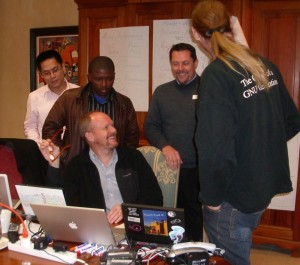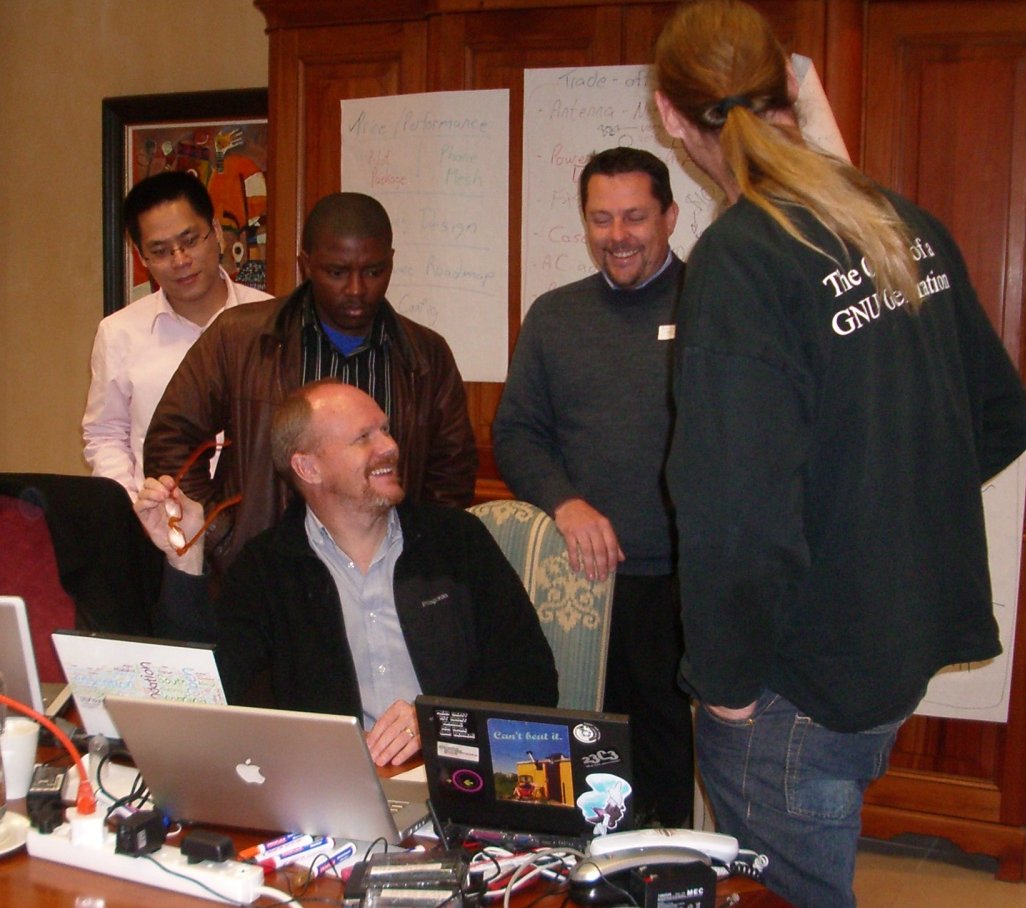For myself and Elektra the workshop was spread across two weeks. We arrived the week before with suitcases full of Mesh Potatoes, soldering irons, Nanostations, and power adaptors. Elektra and I proceeded to “Mesh” the Shuttleworth Foundation guest house we were staying in – over a few days we worked out a network design and configured all of our prototype potatoes so they could talk with each other. There were potatoes and phones and battery chargers and over paraphernalia spread all over the place. One nice innovation was a simple bit of Asterisk dialplan:
exten => _XX,1,Dial(SIP/4000@10.130.1.${EXTEN})
that allowed us to construction a serverless, peer-peer voice network. This dialplan takes a two digit number XX and lets you dial another Mesh Potato with the IP of 10.130.1.XX. Instant local phone network on just a few watts/node, no server required (let alone a cell phone tower or central office exchange). Simply switch on your potato and you can make calls. Imagine the applications for Katrina-style situations where you need instant communications.
We spent some time wandering around the grounds of the guest house with several battery-powered Potatoes, setting up mesh networks and testing the limits of the system by listening to voice quality. Using the batman debug modes we could see the mesh hops go “around corners” and “through windows” to relay calls from one node to another. With Elektra’s help I also learnt a lot about Wifi propagation and it got me thinking about a small design study to optimise end-end system quality in marginal Wifi conditions, as well as ways to instruct people on how to set up a reliable mesh network (like a picture book or videos, or real-time metrics of quality like a GUI or dial-tone).
Wandering around in the South African winter sunshine with a potato and a battery I had an “AH HA” moment that frankly sent shivers down my spine. This thing really works! You sometimes lose track of the big picture when you are engineering all the detail.
After a few days, Elektra and I moved to the larger Kolping Guest House, which was big enough to accommodate all of the Workshop participants. This was a clever move by Steve – he knows that much of the real brainstorming gets done outside of the formal Workshop proceedings. The team Steve assembled was a fascinating group of people, many of whom had traveled from all over the world.
This years workshop was a mixture of demos, group discussions, and actual hacking. We started out with everyone playing with potatoes, making calls while wandering around the Shuttelworth Foundation grounds. Everyone seemed really pleased with the potatoes, which was nice for Elektra and myself. As the discussions proceeded I was impressed with the way all of the details seemed to into place, most of our next steps just seemed logical and were agreed upon by all. Disagreement, although spirited, was limited to the fine detail.
One stand out point for me was ease of configuration. Alan spent some time trying to get a Potato connected to his Asterisk server and it was the usual time consuming Asterisk conf file and command line fun and games. Hard the first time, but easier as you gain experience. However we wish to make Village Telco set up easy for thousands of first time users. This experience drove the point home – we need to make configuration as straight forward as possible. For example we could produce a series of guides (printed or on a wiki) on how to set up popular Asterisk distros with the Mesh Potato.
The hacking days created some useful demos, e.g. Afrimesh on a Potato, Luce Web interface, and a IVR for changing the Potato IP. Curiously we got them all going within about 10 minutes of each other and raced over to show Steve. Here is Steve being “demoed to death”:

The workshop threw up plenty of tasks for the next few months, for example working with Atcom on the production Potatoes, software tweaks, user and set up guides, and optimising the end-end performance. It’s going to be an exciting end to the year!
Full credit to Steve and Wendy (among many others I am sure) at the Shuttleworth Foundation for making this Workshop happen. They were wonderful hosts and really looked after us. The food, wine, and company were every bit as good as the technical content. Thoroughly enjoyable.
